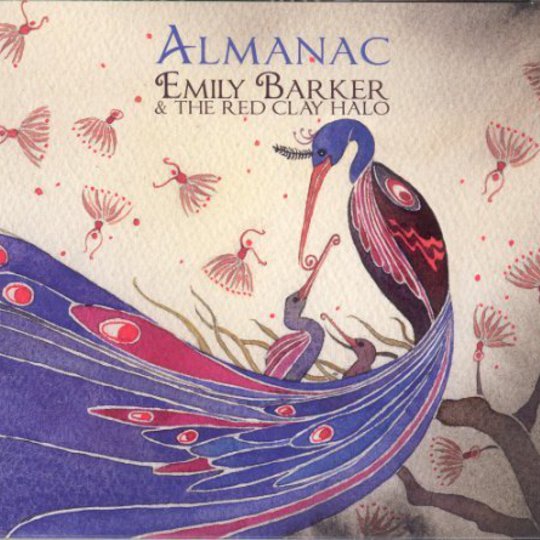An issue that comes up again and again when talking about folk music at the moment is the distinction between the scene’s insiders and the outsiders. Emily Barker’s position within this might seem difficult to place. In 2008, she toured the country with Frank Turner – a man who, having come straight into acoustic music from the hardcore punk underground, has failed to be accepted by folk traditionalists. But ignoring the company she keeps, it’s plain to see that Barker’s music borrows many of the elements that have sustained the tradition for centuries.
There are songs on Almanac – her second album with the three women of The Red Clay Halo – that are clearly in keeping with folk principles. Although the songs are all original compositions, they are largely narrative in form, and often tell stories that have been passed down through generations. This is Barker making her own contribution to the impossibly vast library of folk songs, in a way that is informed by precedents previously set.
The closing track of Almanac, ‘Bones’, vividly portrays the abuses inflicted upon the indigenous people of her native Australia, by the colonial settlers of the early 18th century. It documents an ugly chapter in human history, preserving it to be passed down through the ages. But more importantly (for DiS’s purposes, at least) it is coldly undercut by a groaning dulcimer, as thin sheets of strings are gently placed alongside numb vocals. It all finally spirals into a controlled confusion, recreating calmly and precisely the horror of the song’s subject matter.
The documentary aspect of folk music is also delivered on ‘Witch of Pittenweem’, which depicts a Scottish witch-hunt. The accordion and swaying chord pattern makes this more of a sea shanty, and unfortunately evokes the slightly dated, Arran jumper-wearing images of the folk tradition.
The centrepiece of Almanac, ‘Pause’, finds Barker bravely unshackle herself from the conventions of her genre. In fact, the nakedness of the lone electric guitar and pipe organ ensemble makes it difficult to place the track in any generic bracket. Regardless though, the crisp, tight vocal harmonies provided by The Red Clay Halo make this a mesmerizing, angelic piece of music that somehow lifts you out of its own loneliness.
There are highlights amongst the album’s more dynamic moments too. A complex staccato vocal melody in ‘Reckless’ is cleverly shadowed by rapid banjo arpeggios, constructing a texture that is simplified and enhanced by prodding fiddles each time this motif returns. Equally, ‘Ropes’ is made into far more than a dreary break-up song by cleverly repeated vocal patterns and a fiercely building defiance in Barker’s delivery.
What should be obvious to anyone who listens to Almanac, whether they are a folk fan or not, is that Emily Barker is a confident and accomplished songwriter, and that still counts for a lot. These compositions have clearly been crafted by an expert in the genre. This means that there is plenty in the style and the content of Barker’s music to appease the folk traditionalists (though these same characteristics are likely to put off many more forward-thinking music fans). What’s more, there is enough skill, emotion and beauty in Almanacto attract the more casual folk followers. Emily Barker comes pretty close to striking that tricky balance.
-
7Robert Cooke's Score






















